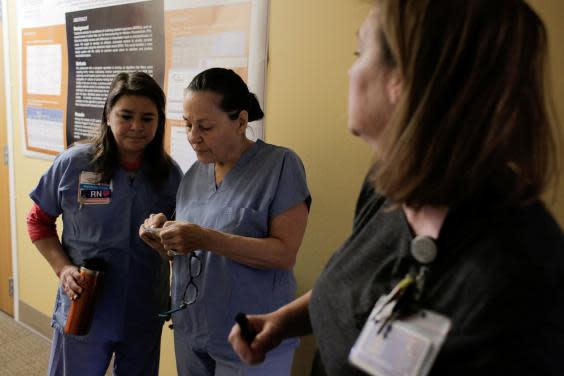New US coronavirus cases revealed as first person dies on American soil

The first person to die from coronavirus in the United States was a man in his 50s with underlying health conditions, officials in Washington state have revealed.
Dr Jeff Duchin, Seattle and King County public health officer, said the man was one of three new cases, two of them linked to a longterm care facility, LifeCare Center of Kirkland.
Of the other two, one is a healthcare worker in her 40s who is said to be in a satisfactory condition, and the other is a resident in her 70s who is in a serious condition.
Jay Inslee, the governor of Washington, has declared a state of emergency, directing state agencies to use "all resources necessary" to prepare for and respond to the outbreak. The declaration also allows the use of the Washington National Guard, if necessary.
"We will continue to work toward a day where no one dies from this virus," Mr Inslee said.
There had been some confusion over the sex of the person who died. An initial statement from the governor referred to him as a man but at a press conference later, Donald Trump said the victim was a woman. Dr Duchin later confirmed that it was a man.
The victim, who has not been publicly identified, had no history of travel to an infected area or contact with someone infected with Covid-19.
Other such "community" infection cases – where people have the virus but it is not clear how they could have got it – have been identified in Oregon and California.
More than 50 people in the LifeCare Center facility are sick and being tested for the virus.
In Kirkland, a neighbourhood 10 miles to the north east of Seattle, residents said they were trying to go about their business without panic.
In the car park of a Whole Foods Market, from where it was possible to see the hospital where the victim had died, one man said there was little they could do other than follow guidance, such as washing their hands.
"I do worry, because I take the bus to work," said Akash Shrivastava, who works in IT and was shopping with his wife, Aditi. "There is only so much you can do," she said.
Michael Epstein, 48, a consultant, said he was following updates from the Centers for Disease Control, and other experts. He was not listening to anything Donald Trump had to say. "For the family of the person who has died it's terrible," he said. "But when you look at how is most at risk, and the fatality rates, you have to try to worry."
Of the claims made by Mr Trump that the US had little to worry about, he said: "I don't listen to anything he says."
A 21-year-old woman who worked as a teacher said it was important people followed all necessary steps to stay healthy.
"I'm a teacher so there is a bit of panic," said the woman, who asked to be identified by her first name, Roxanna. "But people die from the flu every year. So you have to be healthy and stay active."

Cheryl Crowley, 73, a retired paralegal, said she had no intention of changing her plans. She was due to take a flight to the east coast in two weeks and planned to do so.
"What else are you going to do," she said. "You cannot be that scared. Otherwise you'd just stay at home and do nothing."
Read more
Space images show drastic drop in China pollution as coronavirus hits
Coronavirus: Life in a Wuhan suburb besieged by China’s outbreak
Trump says 'no need to panic' after first US coronavirus death
US reports first coronavirus death as outbreak spreads across country
Mike Pompeo refuses to deny coronavirus is ‘hoax to damage Trump’

